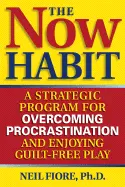
The Now Habit - by Neil Fiore
ISBN: 1585425524Date read: 2013-04-05
How strongly I recommend it: 5/10
(See my list of 430+ books, for more.)
Go to the Amazon page for details and reviews.
Good book with insights and advice on overcoming procrastination.
my notes
Keep track of when and why she procrastinated for a few days to make her aware of when the old views were most likely to lead her into negative patterns. When she found herself procrastinating, she was to be alert to her habit of using procrastination to escape inner conflict and anxiety.
Why we procrastinate: it rewards us with temporary relief from stress.
A defense against fear of success by keeping us from doing our best.
Those who gain their sense of identity from many areas are more resilient when failing in any one area. For example, a professional tennis player is more likely to be upset by losing a match than is an amateur player for whom tennis is only one of many activities in the week.
The more complex and varied your sense of self, the less likely you are to become depressed over stress in one area.
Success means advancement to increasing demands.
Completing a particular project will be a mixed blessing, leading to both gains and losses.
Become aware of how and when you procrastinate.
Record the time spent on each activity throughout your day.
You take more than an hour to “settle in” before really getting started. What would happen to your efficiency level if you started on a high-priority project first thing in the morning, rather than reading the mail?
Even an elementary use of the log will give you important information about your procrastination patterns and inner dialogue. You will want to include as basic information the day and time that you procrastinated, the activity you postponed and its priority, your thoughts and feelings about the task, your reason for procrastinating, the type of procrastination you used, your attempts at reducing anxiety, and your resultant thoughts and feelings.
Alert you to the types of situations in which you are most likely to procrastinate:
• detail activities (example #1): income tax, balancing the checkbook, arranging files, sorting customer records
• home chores (example #2): fixing the screen door, cleaning out the basement, clearing the desk, painting the bedroom
• performance tasks (example #3): giving a speech, presenting your product, confronting an employee
• big or dense projects (example #4): preparing a legal brief, an advertising campaign, or a training manual
These feelings, and the attitudes that cause them, get in the way of efficiently completing difficult tasks.
Examples:
• others are making you do something against your will - doing your income tax in #1 and fixing the screen door in #2
• pressure from yourself to give a perfect performance, as in activity #3, giving a speech
• fear of mistakes and criticism - as in #4, appearing before the judge unprepared
Identify the fears and pressures you typically associate with certain types of projects.
You are often the one who raises the board off the ground by changing a straightforward task into a test of your worth.
You are the one who confuses just doing the job with testing your worth.
Situation A: walk a solid board
Situation B: now the board is 100 feet above ground
Situation C: The building supporting your end of the board is on fire! A small child is on the other side crying for your help.
Now that you have pressure, doing it any old way you can.
Note how many times successful people suffer through catastrophes and bankruptcies. The successful person fails many times and bounces back; but “The Failure” fails once, letting that one failure become a judgment of his or her worth.
“I should do it,” such statements loudly communicate to the mind, “I don’t want to do it, but I must force myself to do it for them.”
“should’s” do not communicate to the mind and body a clear picture of:
• what you choose to do
• when you choose to do it
• where you choose to start it
• how you choose to do it
Focuses on results rather than blame.
Precisely because you have chosen to do it, it becomes less difficult, less painful, and more quickly accomplished. Whenever you catch yourself losing motivation on a project, look for the implicit “have to” in your thinking and make a decision at that moment to embrace the path - as it is, not the way you think it should be - or let go of it. It’s your choice.
The phrase “I have to” (meaning “I have to, but I don’t want to”) will give you a sense of ambivalence and victimization (“I have to, but if I were powerful I wouldn’t”)
This is very important. This project has to impress everyone. This is my one big chance in life.” The bigger and more overwhelming the project seems to you, the greater your tendency to procrastinate.